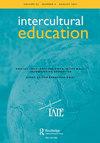Neoliberal influences on the implementation of intercultural curriculum initiatives: teacher interactions with the Australian Curriculum
IF 0.8
Q3 EDUCATION & EDUCATIONAL RESEARCH
引用次数: 1
Abstract
ABSTRACT Curriculum initiatives with intercultural educative aims are not uncommon in many schools around the world. This paper argues that these initiatives and their classroom implementation by teachers is strongly impacted and influenced by the prevailing neoliberal context of schooling. The findings of a project working with teachers on implementing the Intercultural Understanding General Capability and the Aboriginal and Torres Strait Islander Histories and Cultures Cross Curriculum Priority of the Australian Curriculum are used to demonstrate the specific ways in which neoliberalism has shaped and defined teachers’ work. The neoliberal elements of consumption, individual responsibility, individuals being set adrift from values, surveillance and the illusion of autonomy are used to highlight teachers’ approaches to understanding and implementing the curriculum elements in their science classrooms. Teachers in the study saw the potential for enacting social justice in terms of intercultural education in their classrooms but were often hampered in their efforts by prevailing neoliberal discourses influencing their own assumptions and actions, as well as those of the schools they worked in. It is only through interrogation of how neoliberalism impacts on intercultural educative aims that openings for counter-hegemonic activities can be identified.新自由主义对跨文化课程倡议实施的影响:教师与澳大利亚课程的互动
摘要:以跨文化教育为目标的课程倡议在世界各地的许多学校中并不罕见。本文认为,这些举措及其教师在课堂上的实施受到了新自由主义教育背景的强烈影响。一个与教师合作实施澳大利亚课程中跨文化理解一般能力和土著和托雷斯海峡岛民历史和文化跨课程优先权的项目的结果被用来展示新自由主义塑造和定义教师工作的具体方式。消费、个人责任、个人偏离价值观、监督和自主幻觉等新自由主义元素被用来强调教师在科学课堂上理解和实施课程元素的方法。研究中的教师看到了在课堂上实施跨文化教育的社会正义的潜力,但他们的努力往往受到主流新自由主义话语的阻碍,这些话语影响了他们自己以及他们工作的学校的假设和行动。只有通过探究新自由主义如何影响跨文化教育目标,才能确定反霸权活动的机会。
本文章由计算机程序翻译,如有差异,请以英文原文为准。
求助全文
约1分钟内获得全文
求助全文
来源期刊

Intercultural Education
EDUCATION & EDUCATIONAL RESEARCH-
CiteScore
2.30
自引率
8.30%
发文量
36
期刊介绍:
Intercultural Education is a global forum for the analysis of issues dealing with education in plural societies. It provides educational professionals with the knowledge and information that can assist them in contributing to the critical analysis and the implementation of intercultural education. Topics covered include: terminological issues, education and multicultural society today, intercultural communication, human rights and anti-racist education, pluralism and diversity in a democratic frame work, pluralism in post-communist and in post-colonial countries, migration and indigenous minority issues, refugee issues, language policy issues, curriculum and classroom organisation, and school development.
 求助内容:
求助内容: 应助结果提醒方式:
应助结果提醒方式:


